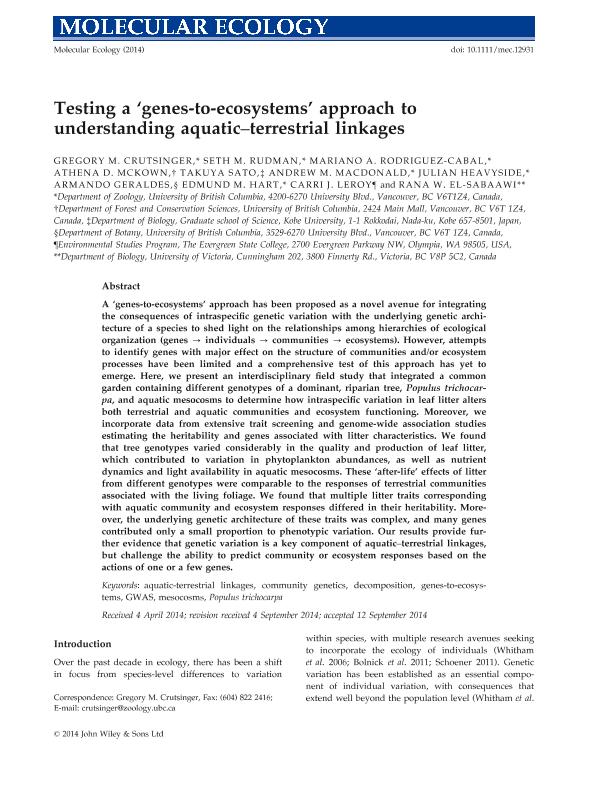Artículo
Testing a "genes-to-ecosystems" approach to understanding aquatic-terrestrial linkages.
Crutsinger, Gregory M.; Rudman, Seth M.; Rodriguez Cabal, Mariano Alberto ; Mckown, Athena D.; Sato, Takuya; Macdonald, Andrew M.; Heavyside, Julian; Geraldes, Arnaldo; Hart, Edmund M.; Leroy, Carri J.; El-Sabaawi, Rana W.
; Mckown, Athena D.; Sato, Takuya; Macdonald, Andrew M.; Heavyside, Julian; Geraldes, Arnaldo; Hart, Edmund M.; Leroy, Carri J.; El-Sabaawi, Rana W.
 ; Mckown, Athena D.; Sato, Takuya; Macdonald, Andrew M.; Heavyside, Julian; Geraldes, Arnaldo; Hart, Edmund M.; Leroy, Carri J.; El-Sabaawi, Rana W.
; Mckown, Athena D.; Sato, Takuya; Macdonald, Andrew M.; Heavyside, Julian; Geraldes, Arnaldo; Hart, Edmund M.; Leroy, Carri J.; El-Sabaawi, Rana W.
Fecha de publicación:
12/2014
Editorial:
Wiley
Revista:
Molecular Ecology
ISSN:
0962-1083
Idioma:
Inglés
Tipo de recurso:
Artículo publicado
Clasificación temática:
Resumen
A ‘genes-to-ecosystems’ approach has been proposed as a novel avenue for integrating the consequences of intraspecific genetic variation with the underlying genetic architecture of a species to shed light on the relationships among hierarchies of ecological organization (genes → individuals → communities → ecosystems). However, attempts to identify genes with major effect on the structure of communities and/or ecosystem processes have been limited and a comprehensive test of this approach has yet to emerge. Here, we present an interdisciplinary field study that integrated a common garden containing different genotypes of a dominant, riparian tree, Populus trichocarpa, and aquatic mesocosms to determine how intraspecific variation in leaf litter alters both terrestrial and aquatic communities and ecosystem functioning. Moreover, we incorporate data from extensive trait screening and genome-wide association studies estimating the heritability and genes associated with litter characteristics. We found that tree genotypes varied considerably in the quality and production of leaf litter, which contributed to variation in phytoplankton abundances, as well as nutrient dynamics and light availability in aquatic mesocosms. These ‘after-life’ effects of litter from different genotypes were comparable to the responses of terrestrial communities associated with the living foliage. We found that multiple litter traits corresponding with aquatic community and ecosystem responses differed in their heritability. Moreover, the underlying genetic architecture of these traits was complex, and many genes contributed only a small proportion to phenotypic variation. Our results provide further evidence that genetic variation is a key component of aquatic–terrestrial linkages, but challenge the ability to predict community or ecosystem responses based on the actions of one or a few genes.
Archivos asociados
Licencia
Identificadores
Colecciones
Articulos(INIBIOMA)
Articulos de INST. DE INVEST.EN BIODIVERSIDAD Y MEDIOAMBIENTE
Articulos de INST. DE INVEST.EN BIODIVERSIDAD Y MEDIOAMBIENTE
Citación
Crutsinger, Gregory M.; Rudman, Seth M.; Rodriguez Cabal, Mariano Alberto; Mckown, Athena D.; Sato, Takuya; et al.; Testing a "genes-to-ecosystems" approach to understanding aquatic-terrestrial linkages.; Wiley; Molecular Ecology; 23; 23; 12-2014; 5888-5903
Compartir
Altmétricas



